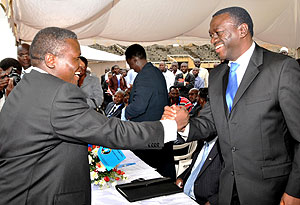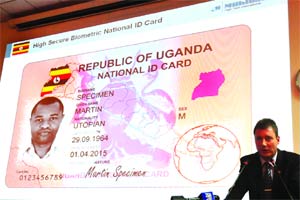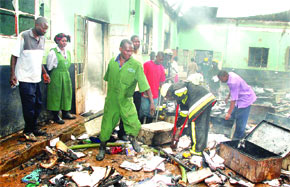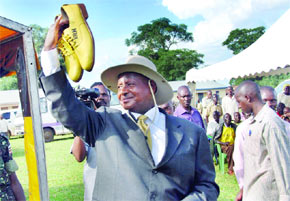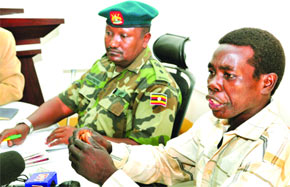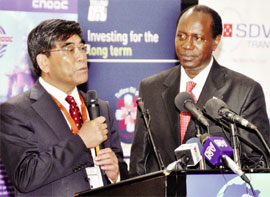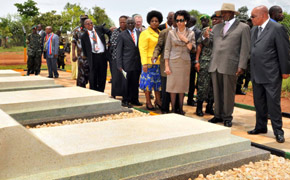GADHAFI MUSEVENI ROW OVER CULTURAL LEADERS AND TRADITIONAL RULERS AND THE PROPOSED UNITED STATES OF AFRICA LIKELY TO INTENSIFY AS AU MEETING IN KAMPALA .
News Analysis By Leo Odera Omolo In Kisumu City.
The love-hate relationship between Presidents Maumor El-Gadhafi and Yoweri Museveni of Uganda is blossoming once again with Kampala-which hosts the upcoming Africa Union Summit warning Libyan strongman not to invite cultural leaders and traditional African rulers at the next meeting.
At the forthcoming AU meeting scheduled for July, a hot debate is expected to centre on how the AU Commission will become an authority with executive powers and act independently.
President Gadhafi, also known as the “King of Kings”, has been mobilizing cultural leaders and traditional rulers to campaign for his vision of an immediate African government, a position Ugandan President Yoweri Museveni has openly rejected.
President Museveni is known to be a strong proponent of a “gradual consolidation of regional economic communities into a continental government”.
Uganda’s Minister for Foreign Affairs Sam Kutesa was quoted this week as saying, “We shall not accept Gadhafi to bring traditional rulers and cultural leaders to the AU Summit. They can play their cultural role but should desist from participating in national and international politics”.
There are now widespread fears in Kampala that President Gadhafi could bring his cultural allies to drum up support, especially since he invited about 100 cultural leaders from around Africa to attend the Toro King Oyo Nyimba’s coronation ceremony in Uganda last weekend.
Gadshafi wants the immediate formation of the United States of Africa, and since the findings for establishment of an AU Authority with wider mandate, compared with the present Commission, will be tabled at the forthcoming AU Summit, different camps are expected to voice their stand on the matter.
“We have not changed our position on how the African Union government should be formed. It should take a progressive step,” Kutesa told the EASTAFRICAN last week.
He added; “Kampala still believes its position for the gradual formation of the African Union government is the best approach and does not want any doubt cast on it.”
At the forthcoming AU Summit, findings of a team of legal experts will be tabled to guide the transformation of the Commission into an Authority, giving the body executive powers to make decisions.
About 3,000 delegates are expected at the 15th Ordinary Session of the Heads of State and Government that runs from July 19 to 27 in Kampala. The theme of the Summit is “Material, Infant and Child Health and Development in Africa”, but the Summit will also discuss peace and security, infrastructure, energy, Agriculture and food security.
Under the new arrangement, governments will still retrain their sovereignty although a president and vice president will head the Authority, and the Commission will have secretaries charged with portfolios.
A week ago, the AU Commissioner for Peace and Security, Remitane Lamamra, said while in Tripoli, Libya, that the transformation of the AU into Commission would be a turning point in driving the process of political integration and economic development in Africa. From other quarters, sources say, the Gadhafi blue print is meeting stiff opposition from moderate African states, especially those in the Anglophone countries.
Many argue that the time is not ripe for such undertakings. This is also the same position with the proposed Federation of East and Central African states under the auspice of the East African Community. The proponents of the federation have been told to go slow over the issue.
Lamamra disclosed that consultants had prepared 11 motions to be amended, supplemented or elaborated on to guide the Authority.
“Presently, the Commission is more of a co-coordinating mechanism. We are creating an institution with a mandate, which will move us towards the goal of the union government”, said Rosette Nyirinkindi, the head of the AU department.
Insiders say, this is not the first time the Kampala regime feel uncomfortable with President Gadhafi’s hobnobbing around with cultural leaders to influence African affairs.
In 2009 the Ugandan government blocked a meeting of 200 kings, princes,sultans,sheikhs and traditional leaders that had been sponsored by the Libyan government to be held in Kampala.
In February 2009 in Addis Ababa, Ethiopia, presidents Gadhafi and Museveni openly clashed over the direction of the formation of a single government for all African states should take.
In November the same year, at the UN General Assembly Summit held in New York on climate change, the two leaders agreed to exclude cultural leaders from politics.
Last year, President Museveni accused the Libyan President of trying to destabilize his government using cultural leaders, because the former had at the 2007 AU Summit in Accra, Ghana refused to support Gadhafi in his bid to become the first president of a United States of Africa.
Early this year, without consultation with the governments, Gadhafi secretly invited cultural leaders to Tripoli where they were lavishly entertained, given tokens of handouts in cash, materials such as motor vehicles, tractors and money. They include those from Kenya and other countries in the continent invited at a different times. And two weeks ago, Gadhafi sent his representative during the installation of the new King of Wanga in Western Province of Kenya, a dormant tribal kingdom, which ceased to exist about 36 six years ago, when the last Monarch Nabongo died. Gadhafi sent his representative with gifts of Television sets, laptops and cash.
Ends
leooderaomolo@yahyoo.com

